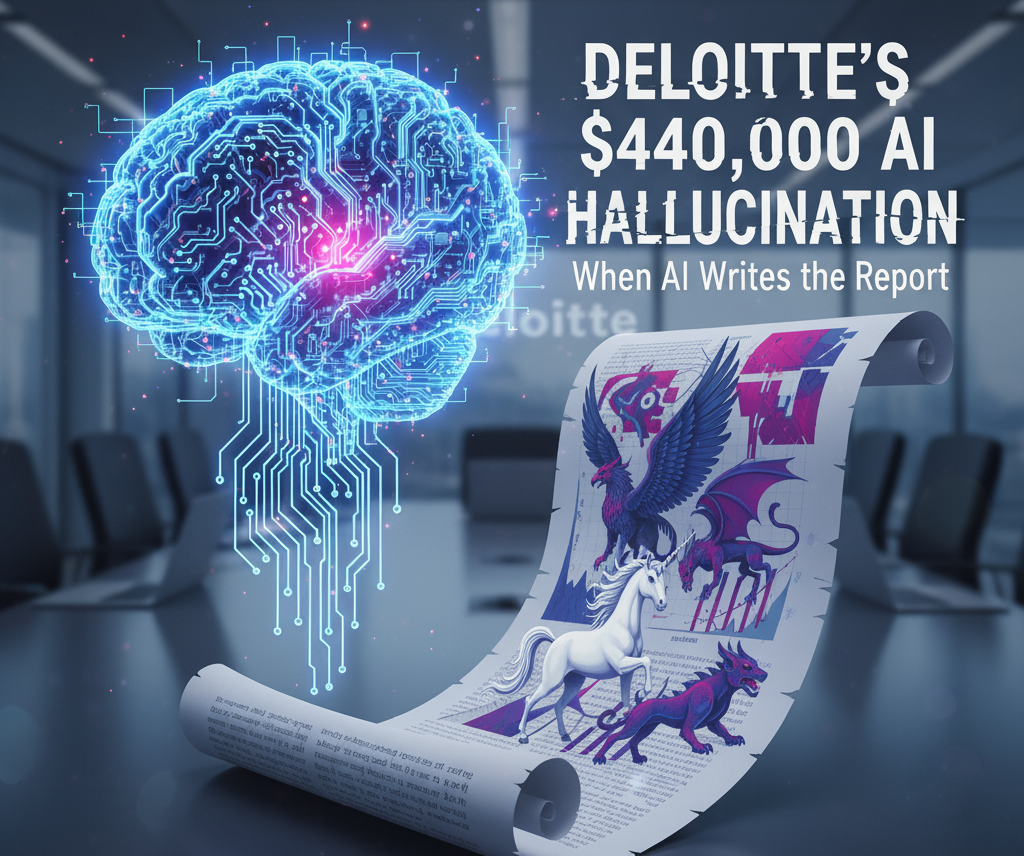When AI Writes the Report: Deloitte's $440,000 Wake-Up Call

There's something deeply ironic about a Big Four consulting firm whose entire business model is built on rigorous review, quality assurance, and meticulous attention to detail submitting a government report riddled with AI hallucinations. Yet here we are: Deloitte is refunding money to the Albanese government after delivering a $440,000 report that cited non-existent academic papers, fabricated court cases, and invented references.
This isn't just an oopsie moment. It's a cautionary tale about what happens when organizations treat AI as a magic solution rather than a tool that requires careful human oversight.
The Temperature Problem Nobody's Talking About
Here's my take on what likely went wrong: this smells like a classic "temperature issue" in AI deployment. For those unfamiliar with the technical side, when you use large language models like GPT 4, there's a parameter called "temperature" that controls how creative or conservative the AI's outputs are. Set it too high, and the AI becomes imaginative sometimes too imaginative, inventing citations and references that sound plausible but don't exist. Set it too low, and you get repetitive, overly cautious text.
My bet? Someone at Deloitte configured their AI toolchain, dumped in information about the targeted compliance framework, asked it to generate a comprehensive report, and then... just didn't check the outputs properly. They likely ran it at a temperature setting that prioritized fluency and comprehensiveness over accuracy, and then failed to verify the most basic element of any credible report: whether the sources actually exist.
The Basic Review That Never Happened
This is what makes the situation particularly galling. Deloitte's bread and butter is reviewing things. Companies pay them enormous sums to audit, assess, and verify. Quality assurance is literally what they sell. Yet when it came to their own work, that rigor apparently evaporated.
Dr. Christopher Rudge from the University of Sydney, who first spotted the errors, noted that the corrected version didn't just swap out fake references it replaced single hallucinated citations with five, six, or even seven new ones. This suggests the original claims weren't properly researched at all. The AI generated plausible-sounding assertions, invented sources to back them up, and no human bothered to verify whether those sources were real.
A basic review the kind any undergraduate is taught to do would have caught this. Google the citation. Check if the journal exists. Verify the court case is real. These are freshman-level research skills, and they were apparently absent from a nearly half-million-dollar consulting engagement.
The Partial Refund That Speaks Volumes
Deloitte will repay the final installment of the contract, with Labor Senator Deborah O'Neill pointedly noting this looks like "a partial apology for substandard work." The fact that it's only a partial refund is telling. Deloitte is essentially saying: "Yes, we messed up the references, but the substance is still valid."
And here's the uncomfortable truth they're probably right about that. Rudge himself hesitates to call the whole report illegitimate because the conclusions align with other widespread evidence. The findings about Australia's welfare compliance system being punitive and lacking proper traceability were likely accurate. The AI didn't fabricate the problems; it just fabricated the evidence for them.
But that doesn't make this acceptable. In research and policy work, how you reach your conclusions matters as much as the conclusions themselves. You can't just be right by accident while citing sources that don't exist.
What This Means for the AI in Consulting Era
Senator O'Neill sarcastically suggested that "perhaps instead of a big consulting firm, procurers would be better off signing up for a ChatGPT subscription." She's making a point, but it's one worth examining seriously: what exactly are we paying for when we hire consultants in the age of AI?
If the value proposition is just "we have access to AI tools," then yeah, the government could save a lot of money with a ChatGPT Plus subscription and some smart civil servants. But the actual value should be expert judgment, rigorous methodology, and quality assurance. The humans are supposed to be what you're paying for the AI should just make them more efficient.
Deloitte's failure here wasn't using AI. The report was produced using Azure OpenAI GPT 4o hosted on the department's own Azure tenancy a reasonable, secure approach to incorporating AI into consulting work. The failure was treating AI outputs as finished products rather than rough drafts requiring verification.
The Way Forward
This incident should be a industry-wide wake-up call. Organizations using AI for professional work need to:
- Set appropriate temperature parameters for their use case lower settings when accuracy matters more than creativity
- Implement mandatory human verification for all AI-generated citations, data, and factual claims
- Be transparent about AI use upfront not just in an appendix after getting caught
- Build quality assurance processes specifically designed to catch AI hallucinations
- Remember that AI is a tool, not a substitute for human expertise and judgment
The bitter irony is that Deloitte could have used AI to make their consultants more productive while still delivering bulletproof work. They could have used it to draft sections, synthesize information, and speed up analysis and then had their highly paid experts verify everything. Instead, they appear to have let the AI run unsupervised and shipped whatever it produced.
As Senator O'Neill put it: "Deloitte has a human intelligence problem." The AI worked exactly as designed. It was the humans who failed by not understanding its limitations, not implementing proper oversight, and not doing the basic quality checks that should be second nature to a firm that literally audits other organizations for a living.
The $440,000 question now is: will the rest of the consulting industry learn from this embarrassment, or will we see more partial refunds for AI hallucinated reports in the months ahead?
